

Esotericism. Range of related philosophical ideas and movements that have developed in the Western world Western esotericism, also known as esotericism, esoterism, and sometimes the Western mystery tradition,[1] is a term under which scholars have categorised a wide range of loosely related ideas and movements which have developed within Western society.
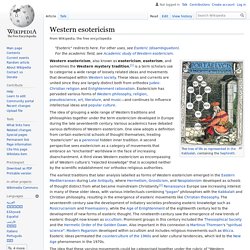
These ideas and currents are united by the fact that they are largely distinct both from orthodox Judeo-Christian religion and from Enlightenment rationalism. Esotericism has pervaded various forms of Western philosophy, religion, pseudoscience, art, literature, and music, continuing to affect intellectual ideas and popular culture. The idea of grouping a wide range of Western traditions and philosophies together under the category that is now termed esotericism developed in Europe during the late seventeenth century. Various academics have debated how to define Western esotericism, with a number of different options proposed. Etymology[edit] [edit] Axiom. An axiom or postulate is a statement that is taken to be true, to serve as a premise or starting point for further reasoning and arguments.

Nous. This article is about a philosophical term.
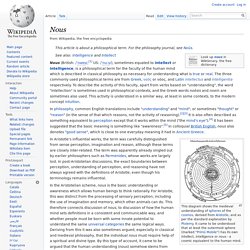
For the philosophy journal, see Noûs. Episteme. Arche. Arche[pronunciation?]

(Ancient Greek: ἀρχή) is a Greek word with primary senses 'beginning', 'origin' or 'source of action'. (εξ’ ἀρχής : from the beginning, ο εξ’ ἀρχής λόγος:the original argument), and later first principle or element, first so used by Anaximander (Simplicius in Ph. 150.23), principles of knowledge (ἀρχαί) (Aristot. Metaph. 995b8). By extension it may mean 'first place, power', 'method of government', 'empire, realm', 'authorities' (in plural:ἀρχαί), 'command'.[1] The first principle or element corresponds to the 'ultimate underlying substance' and 'ultimate undemonstrable principle'.[2] In the philosophical language of the archaic period (8th-6th century BC) arche (or archai) designates the source, origin or root of things that exist.
Doxa. Doxa (from ancient Greek δόξα from δοκεῖν dokein, "to expect", "to seem"[1]) is a Greek word meaning common belief or popular opinion.

Used by the Greek rhetoricians as a tool for the formation of argument by using common opinions, the doxa was often manipulated by sophists to persuade the people, leading to Plato's condemnation of Athenian democracy. The word doxa picked up a new meaning between the 3rd and 1st centuries BC when the Septuagint translated the Hebrew word for "glory" (כבוד, kavod) as doxa. This translation of the Hebrew Scriptures was used by the early church and is quoted frequently by the New Testament authors. The effects of this new meaning of doxa as "glory" is made evident by the ubiquitous use of the word throughout the New Testament and in the worship services of the Greek Orthodox Church, where the glorification of God in true worship is also seen as true belief.
Gnosticism. The Concept of Gnosticism and the Analysis of Spiritual Disorder - This article attempts to establish a rather simple point: Although Eric Voegelin’s analysis of spiritual disorder or “Gnosticism” stands as one of the greatest accomplishments of 20th century political science, the concept of Gnosticism itself has lost its theoretical viability.
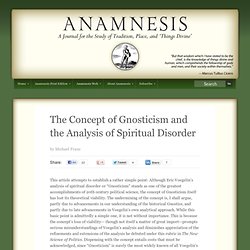
The undermining of the concept is, I shall argue, partly due to advancements in our understanding of the historical Gnostics, and partly due to late advancements in Voegelin’s own analytical approach. While this basic point is admittedly a simple one, it is not without importance. Apeiron (cosmology) Apeiron (ἄπειρον) is a Greek word meaning "unlimited," "infinite", or "indefinite"[1] from ἀ- a-, "without" and πεῖραρ peirar, "end, limit",[2] the Ionic Greek form of πέρας peras, "end, limit, boundary".[3] His ideas were influenced by the Greek mythical tradition and by his teacher Thales (7th-6th century BC).
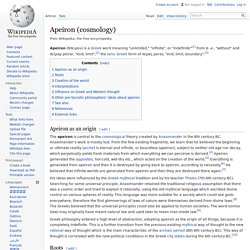
Searching for some universal principle, Anaximander retained the traditional religious assumption that there was a cosmic order and tried to explain it rationally, using the old mythical language which ascribed divine control on various spheres of reality. This language was more suitable for a society which could see gods everywhere; therefore the first glimmerings of laws of nature were themselves derived from divine laws.[8] The Greeks believed that the universal principles could also be applied to human societies. The word nomos (law) may originally have meant natural law and used later to mean man-made law.[9] Scholars in other fields, e.g. Common sense. Common sense is a basic ability to perceive, understand, and judge things, which is shared by ("common to") nearly all people, and can be reasonably expected of nearly all people without any need for debate.[1] The everyday understanding of what common sense is derives from philosophical discussion, involving several European languages.
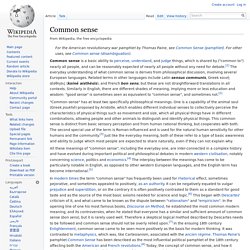
Related terms in other languages include Latin sensus communis, Greek κοινὴ αἲσθησις (koinē aísthēsis), and French bon sens, but these are not straightforward translations in all contexts. Similarly in English, there are different shades of meaning, implying more or less education and wisdom: "good sense" is sometimes seen as equivalent to "common sense", and sometimes not.[2] "Common sense" has at least two specifically philosophical meanings.
Aristotle, who is the first person known to have discussed "common sense". Aristotelian common sense[edit] Alief (belief) In philosophy and psychology, an alief is an automatic or habitual belief-like attitude, particularly one that is in tension with a person’s explicit beliefs.[1] For example, a person standing on a transparent balcony may believe that they are safe, but alieve that they are in danger.

A person watching a sad movie may believe that the characters are completely fictional, but their aliefs may lead them to cry nonetheless. A person who is hesitant to eat fudge that has been formed into the shape of feces, or who exhibits reluctance in drinking from a sterilized bedpan may believe that the substances are safe to eat and drink, but may alieve that they are not. And a person who believes in racial equality may nonetheless have aliefs that cause them to treat people of different racial groups in subtly different ways.
Chaos (cosmogony) Abyss (religion) In religion, an abyss is a bottomless pit, or also a chasm that may lead to the underworld, the ocean floor or hell.

The English word "abyss" derives from the abyssimus (superlative of abyssus) through French abisme (abîme in modern French), hence the poetic form "abysm", with examples dating to 1616 and earlier to rhyme with "time". Acatalepsy.